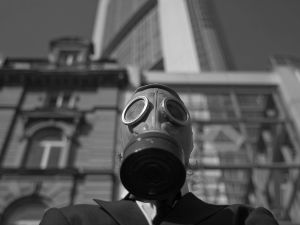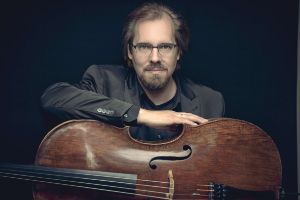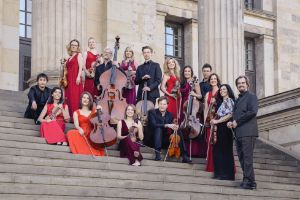Concert
IPPNW Charity Concert
For IPPNW (International Physicians for the Prevention of Nuclear War, Nobel Peace Prize1985) and ICAN (International Campaign to Abolish Nuclear Weapons, Nobel Peace Prize 2017)
Welcome by Dr. Alex Rosen (IPPNW)
„The world before the nuclear war - where is the resistance?”

ICAN campain in front of the Commerzbank in Frankfurt © ICAN
The benefit concerts in aid of IPPNW (International Physicians for the Prevention of Nuclear War) have been part of the Musikfest Berlin for many years. The issue highlighted by this federation of doctors, which was awarded the Nobel Peace Prize in 1985, has sadly become drastically more topical and acute in recent years. In 2007 IPPNW along with other non-government organizations founded ICAN, the International Campaign to Abolish Nuclear Weapons, which was presented with the Nobel Peace Prize in 2017. For this year’s concert it has been possible to secure the services of the Ensemble Metamorphosen Berlin. This was formed in 2010 at the instigation of cellist Wolfgang Emanuel Schmidt by young, enthusiastic chamber musicians who have presented a series of their own concerts at Konzerthaus Berlin and who recently released a much-praised debut CD.
Leoš Janáček’s first piece for orchestra, which still clearly shows traces of the influences the young artist felt when composing it, is followed by the First Violin Concerto by Joseph Haydn. For a long time this was considered lost until a copy was rediscovered in 1961 and the work then soon found its way into the standard repertoire. The solo part is particularly ambitious and Joseph Franz Weigl, the friend for whom Haydn wrote the piece, was a brilliant master of his instrument. It has a chance to unfold its fresh vitality here in especially convincing style with this cast of chamber musicians and led by soloists.
Rudolf Barschai was a close friend of Dmitri Shostakovich. He was aware that Shostakovich had begun composing the string quartets in times of severe political repression and had confided a great deal in the chamber music genre for which in other circumstances he might have sought out the broader forum of the symphony. With the composer’s permission he transcribed some of the 15 quartets for chamber orchestra, including the central piece, the Eighth Quartet. In this Shostakovich had written an autobiography, composing it from an anagram of his name, the series of notes D-S-C-H, and using themes that had played a significant role in his development as an artist and his disputes with the authorities. He thus created a passion in the double sense of suffering witnessed and emotional outpouring near Dresden in 1960.
Leoš Janáček [1854–1928]
Suite for string orchestra [1877]
Joseph Haydn [1732–1809]
Concert for violoncello and orchestra No. 1 in C major Hob VII b: 1 [1783]
Dmitri Shostakovich [1906–1975]
Chamber Symphony in C minor op. 110a
Orchestration of Rudolf Barschai [1960]
Metamorphosen Berlin
Wolfgang Emanuel Schmidt violoncello and conductor
A joint event by IPPNW-Concerts, Berliner Festspiele / Musikfest Berlin and Berliner Philharmoniker Foundation

